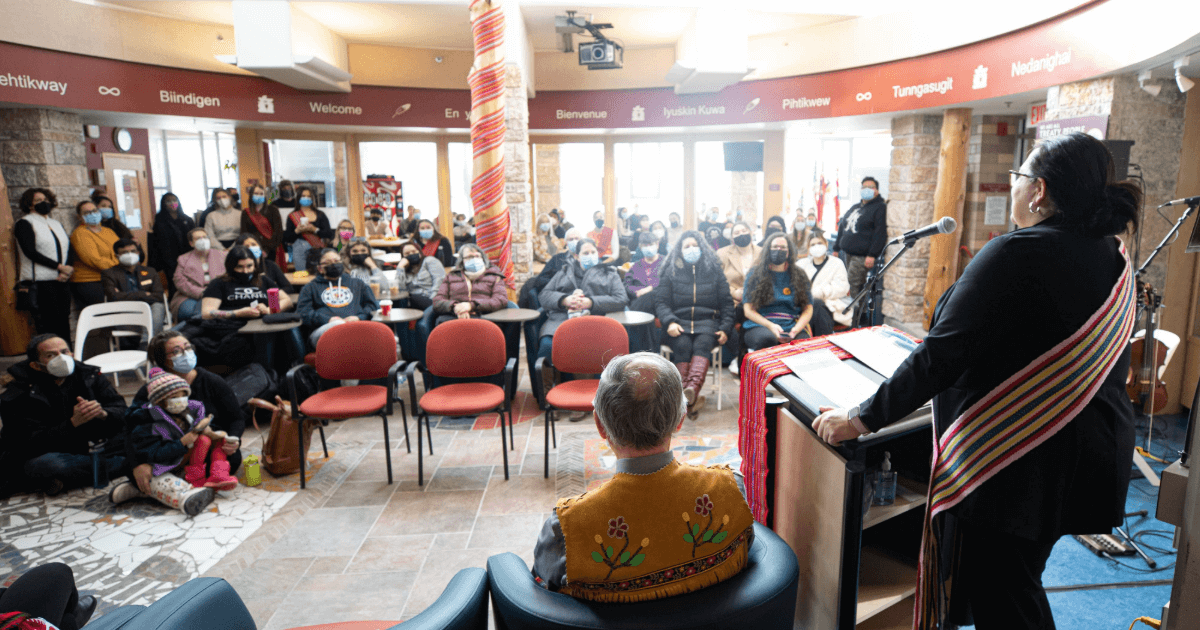
Past Louis Riel Day celebration at Migizii Agamik -- Bald Eagle Lodge, 2023.
Celebrating Louis Riel
New bill recognizing Riel sets the stage for annual Louis Riel Day celebration
This year’s Louis Riel Day marks the first celebration since the introduction of a bill to recognize Riel as Manitoba’s honorary first premier. UM Today spoke with three members of the Métis community at the University of Manitoba about the significance of this recognition.
“For all of us in Manitoba and across Canada, it’s acknowledging the true history of our province and re-centring the truth of our shared stories,” says Vanessa Lillie, director of cultural integration at UM, who is Cree and Métis with roots in Peguis First Nation.
“Métis people have known for a long time that Riel was the father of our province,” says Lucy Fowler, a Two-Spirit Métis woman from Winnipeg, Manitoba Métis Federation (MMF) citizen and assistant professor in UM’s Faculty of Education. “He was a passionate leader aiming for a better future for his people—[this] reinforces what we understood about him.”
“It shows we were legitimate and still are, as the precursor of the provincial government we know today,” adds Indigenous studies master’s student Lydia Gork from the Red River Métis Nation. “It’s an acknowledgement of Métis sovereignty.”
For Gork, the bill also holds a personal connection. One of her ancestors, François Dauphinais, was the vice-president of Riel’s provisional government and jailed by the Wolseley expedition, a military force authorized to confront Riel and the Métis. “By acknowledging Riel and the provisional government, this bill is helping to give my ancestor the honour he deserved,” she says.
UM’s connection to the Métis Nation
According to UM’s Office of Institutional Analysis, more than half of the 2,735 Indigenous UM students self-declare as Métis. Recognizing the dynamic contributions of the Métis community contributes to a sense of belonging while honouring UM’s history, which is deeply intertwined with the Métis people.
UM campuses are on the National Homeland of the Red River Métis; specifically, “the [Fort Garry] campus itself is located on former river lots that Métis people owned,” says Gork. UM’s first-ever planned gift also holds a special connection. In 1883, Métis scholar, educator, lawyer and author Alexander Kennedy Isbister bestowed $83,000 and nearly 5,000 books to UM, a gift that still benefits students today.
“Recognizing Riel and Métis governance helps re-centre some of these histories that UM is situated within,” says Gork. “I’d like to continue to see the historical narrative demonstrate intersections between Métis history and the university… it would help the community draw a deeper appreciation of the contributions Métis people made so UM could exist today and so Métis students can feel more comfortable on campus.”
Join in the Louis Riel Day celebrations at UM
The UM community is invited to a celebration of Métis culture at the annual Louis Riel Day event on Friday, Feb. 16.
“People can expect lots of food, music, activities and opportunities to learn more about the incredible contributions of the Métis people to the community and to Manitoba,” says Lillie. “It’s a celebration and the event will reflect that.” It will also host representatives from the Métis community and MMF.
Other opportunities to learn and connect
There are plenty of opportunities for the UM community to learn about Métis history and culture year-round, including courses in the department of Indigenous studies and events on campus and through the MMF Bison Local. In September, Fowler is also co-hosting Mawachihitotaak: Métis Studies Symposium, bringing Métis scholars from across the homeland to UM’s Fort Garry campus.
In addition to academic opportunities, Gork encourages fellow Métis students to attend social gatherings to connect with their culture and community.
“UM can be an academically intense space but historically, Métis people have always taken the time to enjoy one another’s company after a hard day’s work,” she says. “It’s important to have those [academic] initiatives but also moments of cultural gathering so people can build relationships with each other.
“I think Elders and youth are a big part of our culture, so the more we can connect with them, the more our culture and nation can thrive,” she continues. “Sitting down with Elder Norman Meade [at the Indigenous Student Centre] or other Métis Elders can create kinship ties with other Métis people.”
Looking to the future
As the Honourable Justice Murray Sinclair once stated, education is the key to Reconciliation. Initiatives like the introduction of the Riel bill help “tell the truth of our stories,” says Lillie. “It’s not only educating within an academic setting but educating Manitobans and Canada as a whole.”
Fowler also emphasizes the importance of including contemporary examples of Métis representation along with the historical.
“History shapes who we are as a nation, but Métis people exist today, building the future Riel was dreaming of,” she says. “We need to not only think about Riel but also the other powerful Métis people who have shaped the Métis Nation: all of the grandmas, aunties, cousins and community members who are the backbone and heart of the nation.”
Everyone is welcome to attend the Louis Riel Day celebration on Feb. 16 at UM’s Fort Garry campus. Please register for the free event to help with catering planning. For more Indigenous events, visit the Indigenous events calendar.






